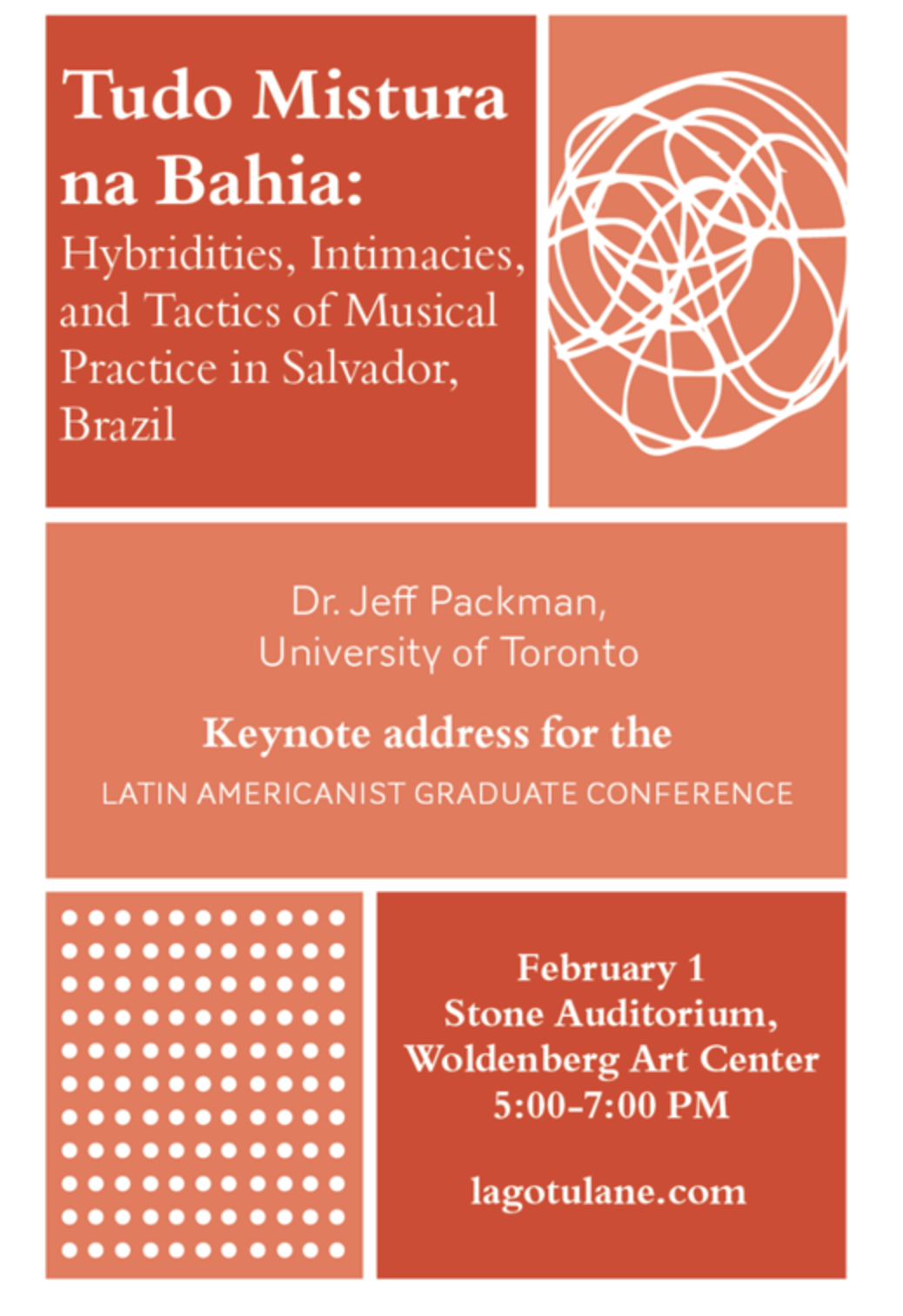
Join the Latin Americanist Graduate Organization (LAGO) for their annual conference from Friday, February 1 – Sunday, February 3. This year’s conference, Entanglement and the Spaces in Between: Discourses and Processes of Hybridity in Latin America will include papers which engage with issues of hybridity not only as a defined product, but as an ongoing practice and a continuous process. The keynote address will be given by Jeff Packman, University of Toronto, titled Tudo Mistura na Bahia: Hybridities, Intimacies, and Tactics of Musical Practice in Salvador, Brazil at 5:00 PM in the Stone Auditorium, Woldenberg Art Center 210 on Friday, February 1. The keynote will be followed by a reception.
To celebrate the end of the conference and everyone's hard work, LAGO would like to invite participants to the annual Pachanga at Down the Hatch on Saturday, February 2 at 8:00 PM. Food and drinks provided. Music by DJ Malaria.
The complete schedule may be found at the official conference website.
Conference Schedule
Friday, February 1
10:00 AM
Latin American Library Collections Session
Research and Instruction Librarian Dr. Rachel Stein will be giving a tour of the Latin American Library and some of its collections to conference attendees. Learn more about fellowship opportunities, special and digital collections, and how to use the library’s resources. If you'd like to join, please RSVP to rstein7@tulane.edu.
12:00 – 1:45 PM
Entanglements in the Archive
Greenleaf Room, Jones Hall
2:00 – 3:45 PM
Topology and Embodiment
Greenleaf Room, Jones Hall
5:00 PM
Keynote Address and Reception: Tudo Mistura na Bahia: Hybridities, Intimacies, and Tactics of Musical Practice in Salvador, Brazil
Stone Auditorium, Woldenberg Art Center
Saturday, February 2
9:30 – 11:00 AM
Environmental Education and Praxis
Greenleaf Room, Jones Hall
Identity and Design in Colonial Latin America
Jones Hall 102
11:15 AM – 12:45 PM
The Metaphysics of Power
Greenleaf Room, Jones Hall
Decolonization, Democracy, and Autonomy
Jones Hall 102
12:45 – 1:30 PM
Lunch break
1:30 – 3:00 PM
Language and Politics
Greenleaf Room, Jones Hall
Migration and Precarious Citizenship: Identity and Memory in the 20th Century
Jones Hall 102
3:15 – 4:15 PM
New Directions in Hybridity
Greenleaf Room, Jones Hall
4:30 – 5:30 PM
Group reflection and discussion
Greenleaf Room, Jones Hall
8:00 PM
Pachanga at Down the Hatch
Sunday, February 3
10:00 AM – 12:00 PM
Tour of Per(Sister)
Megan Flattley will provided a guided tour of the Per(Sister): Incarcerated Women in Louisiana exhibit at Newcomb Art Museum. No RSVP to attend.
Conference Description
As several cultural critics from Stuart Hall and Arjun Appadurai to Néstor Garcia Canclini, Avtar Brah, and Carolyn Dean and Dana Leibsohn have shown, the contemporary world is characterized by transnational migrations, cultural appropriations, and diasporic experiences, all contributing to the collapse of the spheres of the local and the global. Cultural hybridity in Latin American locations and temporalities becomes a site for individuals or communities to negotiate and define their often marginalized positions and to challenge well-established hegemonic discourses and hierarchies. In Franz Fanon's definition, hybridity is never a specific moment but an ongoing struggle, a continual emergence, a "zone of occult instability." (1961)
As one of the long-reigning paradigms for understanding the cultural and symbolic practices of Latin America and its diasporic communities, hybridity has also been subjected to substantial critiques by as many scholars as those that originally proposed it as a model. These critiques invite us to think about the ways in which hybridity has historically facilitated colonial processes of domination as well as modern-day oppressive power dynamics. As well, critiques of hybridity have brought up the fallacy involved in thinking of hybridity as a new process, when, in fact, all of world history is characterized by unstable cultural formations, rather than pure cultural practices that then become hybrid through contact with others. Thus the term has rightly become a contested ideological ground in itself, one that calls for the examination of its critical assumptions. Globalization and technology have redefined longstanding binaries in the historiography of Latin America and challenged us to re-think important issues relating to democracy, cultural rights, and citizenship. As such, we consider it now more than ever a fitting time to re-examine and critique the usefulness of hybridity as a discursive method and process for action and activism. In which productive directions can we take this sometimes idealized framework, after its critiques have so soundly pointed out its problems?
The Tulane Latin American Graduate Organization's annual graduate conference will adopt an expansive perspective on both the advantages and drawbacks of the framework of "hybridity" and welcome proposals that engage with (or challenge) these questions from across academic disciplines:
How does hybridity manifest itself as a process or a performance in Latin American Studies?
Is hybridity still a relevant framework for conceptualizing Latin American experiences? Have the critiques leveled at the term neutralized its critical thrust?
How does the concept of hybridity relate to or perpetuate structures of power?
How does hybridity engage with the visible and/or the invisible? What does it simultaneously reveal and conceal about processes of mixing?
How does hybridity as a concept enter into and engage with notions of modernity?
How do strategies or processes of cultural reconversion condition the experiences of their agents? Do they fundamentally alter their relationship to traditional cultural forms?
How does hybridity relate to issues of globalization, democracy, cultural rights, and/or citizenship?
